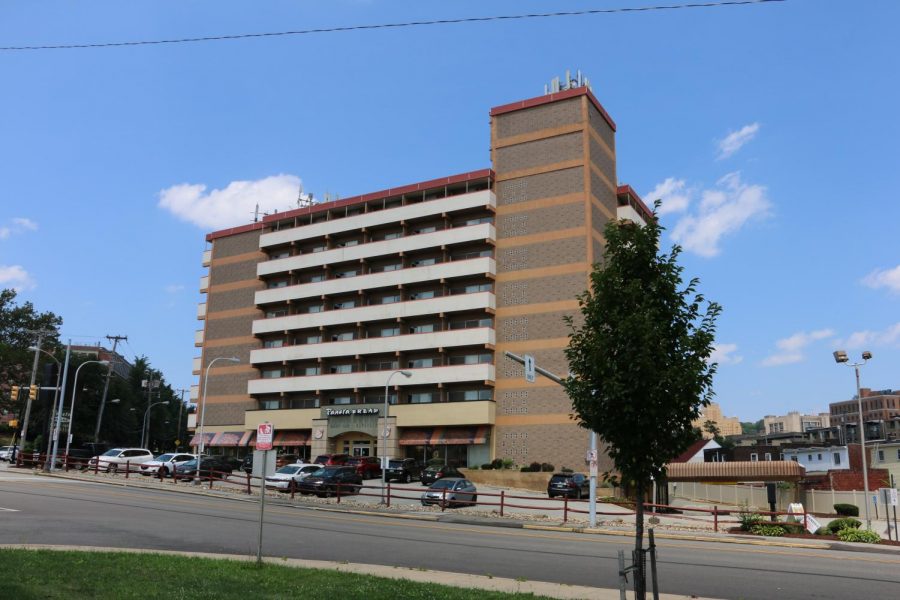Oakland Crossings on hold as Walnut Capital grapples with rising costs


Vegetables in a grocery store.
Walnut Capital has paused development on a planned housing, retail and grocery project near the Boulevard of the Allies, citing inflationary pressures and rising interest rates.
Favorable market conditions turned sour during a series of delays, Walnut Capital President Todd Reidbord said, but the Shadyside developer remains “100% committed to the concept of the Oakland Crossings Master Plan.”
The developer planned to break ground on the first phase of Oakland Crossings early this year, starting construction on a full-service grocery store, 8,000 square feet of retail space and 426 apartment units. These amenities, plus a 438-space parking garage, would all be within a single building at the former Quality Inn and Isaly’s sites.
Walnut Capital will consider reordering the phases of Oakland Crossings during the pause, potentially pushing the mixed-use building lower on the to-do list. Other phases of the project have yet to be finalized, but could include a pedestrian bridge over the Boulevard and new green space.
“You can’t just put your head in the sand and move forward,” Reidbord said. “You have to understand the market and react to market conditions.”
The developer, in partnership with Pitt, hopes to attract working professionals with these apartments and diversify a neighborhood dominated by students. Walnut Capital won the bid to redevelop the University-owned lot in 2019, according to a University spokesperson.


(TPN File Image)
Pitt declined to name the employee speaking on behalf of the University, but offered additional comment from Anish Kumar, the vice chancellor for real estate.
“The University remains hopeful about the project’s future and shares a vision with the community in which Oakland benefits from denser quality housing, more affordable housing and a grocery store,” Kumar said.
According to Reidbord, Oakland must increase its non-student population to attract and retain a full-service grocery store.
“The reason there’s no grocery store in Oakland today is very, very, very simple — there is not enough population other than students, who can’t support a grocery store because they’re not here all year round,” Reidbord said.
Oakland has long struggled with food desert issues, particularly after the IGA on Forbes Avenue closed in 2017. The University’s Forbes Street Market effectively replaced the IGA the following year, but has a reputation for marked-up prices and limited selection.
Then-Mayor Bill Peduto first introduced Walnut Capital’s rezoning proposal to City Council in September 2021, sparking criticism from community organizations and residents.
The developer struck a deal with Mayor Ed Gainey in March 2022 to advance the project to the City Planning Commission, removing plans to redevelop swaths of McKee Place and Louisa Street in the process.
The deal also pared down the scope of the project from 18 to 13 acres, and placed it within a new zoning district called “Urban Center – Mixed Use.” The UC-MU allows Walnut Capital to closely incorporate residential and commercial elements as part of Oakland Crossings.
Walnut Capital also agreed to make 10% of apartment units affordable to residents at or below 50% of the area median income for at least 35 years, similar to other inclusionary zoning overlays in Pittsburgh.
The affordable housing component is one of several financial stressors on the project, Reidbord said, but scarce labor, high construction costs and rising interest rates are also impacting its feasibility.
“When we started this project…we could absorb the affordable housing within our economic model,” Reidbord said. “But now, I don’t think we could as we sit here today.”
Reidbord added that Walnut Capital remains committed to affordable housing and supporting an economically diverse community in Oakland.
Oakland Crossings encountered multiple delays in the Mayor’s office after residents and community groups, including Oakland Planning and Development Corporation, criticized a perceived lack of community input on the project.
Andrea Boykowycz, interim director for OPDC since Wanda Wilson’s departure in November, broadly supports the project’s objectives, despite past criticism.
“We would love to see that site developed for dense multi-family residential use,” said Boykowycz. “It is a very attractive location for a neighborhood-serving grocery store, which is something that Oakland residents of all walks of life have requested, advocated for, beseeched people to create for decades.”
Boykowycz drew parallels between the original construction of the Quality Inn and Oakland Crossings, both of which took convoluted paths through city government. City Council overruled opposition from the planning department to green light the hotel.
“And here we are some 50-odd years later. It’s time to bring it down,” Boykowycz said. “These big vaunted claims about how amazingly transformative this particular development project is going to be might be a little bit ambitious.”
Reidbord declined to specifically blame any organizations or entities for the delays, but said the pause shows the downside of a drawn-out planning process.
“It doesn’t do any good to place blame in my mind,” Reidbord said. “It’s what I call a lesson learned.”
Recent Posts
SGB introduces new governing code bill and addresses rumors of ICE on campus
At its weekly meeting at Nordy’s Place on Tuesday, Student Government Board introduced an omnibus…
Opinion | School should be in the summer
Although this may be controversial, I believe that from this data, it is evident that…
Weathering the storm: Pittsburgh teams have tackled some of the toughest environments
The end of the year in western Pennsylvania is always marked by two things —…
Notes From an Average Girl // Notes on Book Banning
In this edition of Notes From an Average Girl, senior staff writer Madeline Milchman writes…
To Be Honest // Yup, it is that damn phone
In this edition of To Be Honest, staff writer Evin Verbrugge writes about her phone…
Meaning at the Movies | Portraying Toxic ‘Adolescence’
In this edition of Meaning at the Movies, staff writer Lauren Deaton explores the mini-series…

